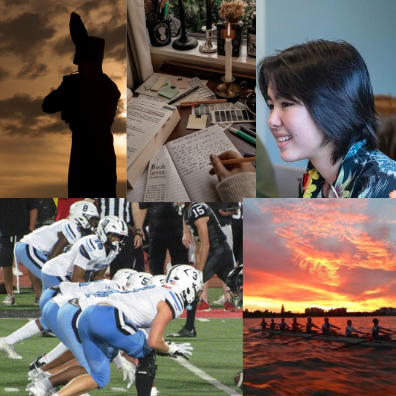Students are well into the beginning of the school year by now and the usual extra-curricular flurry has already begun. As upperclassmen frantically look to find last-minute leadership opportunities, underclassmen eagerly seek groups that fit their interests and are worthy investments of their time.
The perfect way for students to avoid this frenzy and reach their extra-curricular dreams is by following the guidance of the school’s best student leaders and their breadth of advice on how to get involved.
“There’s lots of different communities at Stone Bridge,” cross-country captain Amanda Chin said. “Having a passion for one of those communities, trying to inspire others to join, and motivating others to do well in that community is important.”
Learning the essential elements of students’ extracurriculars, including plays and techniques, is important. However, leadership also holds a broader scope than the ins and outs of a particular sport or art. It requires the establishment of a communal vision.
“Leadership is the ability to unite a group of people under a common goal and inspire them to take action,” marching band drum major Kennedy Gilbert said. “[Uniting] under a common goal is important, because action without unity is chaos.”
Gilbert’s sentiment was mirrored by nearly all fifteen of the student leaders interviewed by the Tribune. Providing parameters and etiquette for their community is something all student leaders sought to confidently employ.
“I think it takes a lot of compassion to be a student leader because you really do have to know who you’re working with,” FBLA president Nishita Kashyap said. “It takes patience, and you can’t just work with somebody based on what you see at first sight. You have to get to know someone and see what they bring to the table.”
Passion holds just as much importance as compassion when it comes to leadership. Sport captains are elected by their teammates at the beginning of the season while many of the club and organization leaders are selected by the adult sponsor. Marching band drum majors are chosen by a five hour audition process preceded by weeks of preparation. For those who wish to one day end up in these positions, it is important to know that these titles require a lot of dedication.
“I’m passionate about the sport, “rowing team captain Nora Bradley said. “I actually enjoy it and I work hard because I want it to mean something…Student leadership doesn’t have to be the person on top; student leadership is the person stepping up to the plate.”
Seizing opportunities is a surefire way to rise in the ranks of a club’s leadership team. Granted, lacking this insight will not directly keep leaders from earning positions, but by mirroring the actions of the school’s best student leaders, qualified and passionate students will rise to the challenge.
“Loudoun County and Northern Virginia are so competitive,” theater department president Miranda Ridgely said. “People feel that having these leadership positions and clubs will give them an edge, so sometimes they seek them out, even if they don’t care about them…It’s really unfortunate because I feel like it has created this environment where people are doing whatever they can to grasp at leadership positions when sometimes they’re not the best for the job.”
As obvious as it may sound, students should only join the clubs and organizations they have a passion for and interest in. If they work hard, show dedication, and use empathy, then one day they can excel and assume a leadership role of their own.
“[Students] first need to want it,” marching band drum major Dash Loyer said. “They need to know the responsibilities that come with it, and see past the title. They need to be ready for that responsibility and determined to work once they’re there. Once you get the position, that’s just the start.”




